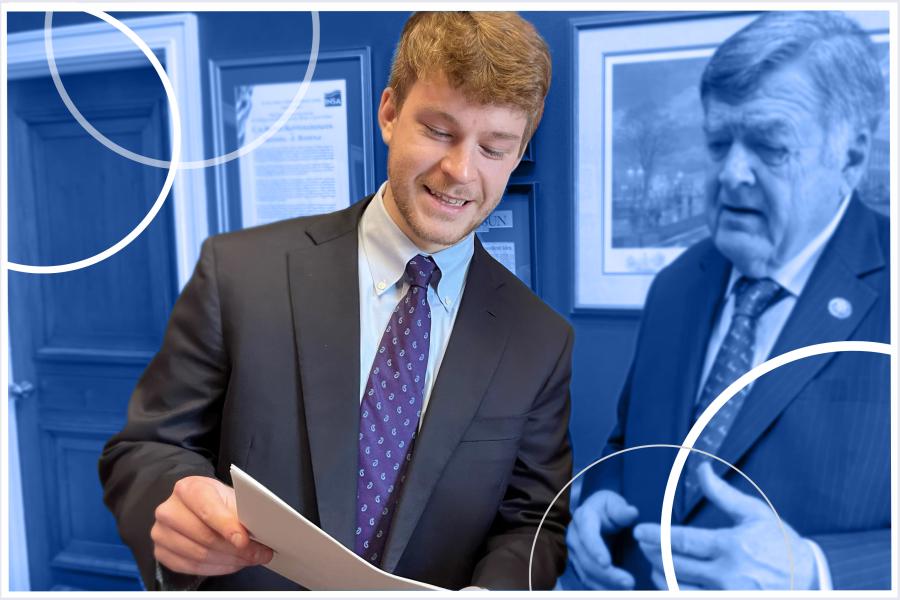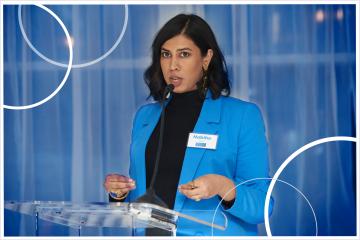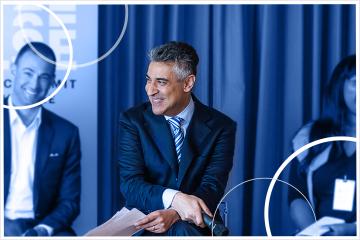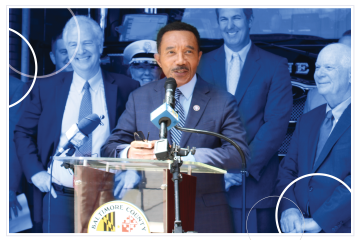The Johns Hopkins Changemakers Profile is a monthly feature spotlighting the impact of Johns Hopkins alumni in positions of influence in Washington, D.C., policymaking circles.
Louis Burns came to Johns Hopkins University in 2018 to pursue a degree in international relations because of the school's proximity to where he wanted to work: the nation's capital.
He got his wish, but not exactly as he envisioned.
The Columbus, Ohio, native started his first Washington, D.C. internship on Capitol Hill on Feb. 1, 2021, less than a month after the Jan. 6 attack on Congress.
"It was a strange first day," said Burns, who parlayed his internship into a full-time job as a legislative correspondent for U.S. Rep. Dutch Ruppersberger (D, Md.). "There were fences all around the Capitol complex, and you had to show your ID coming out of the [Capitol] train station."
Occupation: Legislative correspondent, U.S. Rep. Dutch Ruppersberger (D, Md.)
Age: 23
Hometown: Columbus, Ohio
Education: JHU, Bachelor's Degree, International Studies, 2021
The fences have mostly gone but the specter of political violence lingers.
"It's always looming in people's minds around here," Burns said.
Despite the horrific display of the nation's political divisions on Jan. 6, Burns said the attack obscures what has been a surprising relief: more bipartisanship takes place in Congress than the public realizes.
Through Ruppersberger's position on the powerful House Appropriations Committee, Burns witnesses first-hand the compromises that are hashed out to allocate the hundreds of billions of federal dollars needed to operate government agencies.
"Every voting week there are dozens of suspension bills that require a two-thirds majority to pass," he said. "Many of the laws that pass like that are significant and require compromise. There is a lot of compromise and progress being made behind the scenes."
Burns's position requires him to correspond directly with Ruppersberger's constituents through phone calls, emails, and letters. Once immediate assistance requests are managed, other interactions—opinions on issues and pending legislation, for example—are entered into a database that helps staff track the pulse of voters in Maryland's 2nd District.
He then drafts and sends responses related to all policy issues. He also tracks a legislative portfolio that includes energy, technology, telecommunication, human rights, and LGBTQIA Issues.
"It has definitely been a really great start to my career in policy," Burns said.
Ruppersperger characterized Burns as an important part of his team.
"Lou is an asset not only to my team, but the constituents of Maryland's Second District," the congressman said. "He is an incredible writer and has a gift for breaking down complicated policy into language that enables constituents to better understand its impact on their everyday lives. In his roles, Lou touches just about everything our office does in terms of lawmaking, constituent service, and outreach, and he brings a fresh perspective to all of it. He is indispensable."
One day Burns wants to specialize in a specific policy area—perhaps international affairs. But he is finding domestic policy to be just as intriguing and challenging, a career path that first became apparent to him while on a Hopkins-supported trip to the Capitol. Then the pandemic canceled his junior year trip to China, forcing him to find a domestic internship. That landed him in Ruppersberger's Timonium office.
"There I learned the impact that domestic policy has on people's lives," he said. "Working on the Hill is a great opportunity to help shape public policy that can have a transformational impact on people's lives."
Hopkins prepared him with the ability to quickly consume copious amounts of information by knowing what parts to skim as well as to be able to write effectively to translate comprehensive topics in as few words as possible.
"When you get to Hopkins you hit a moment where it's sink or swim in terms of managing your time," he said. "Learning that time management skill has trained me well for the real world."
His hope is to one day ascend to a legislative director position. He is working to expand his policy base, learn the Congressional processes, and build a network of people—including through his connections at Johns Hopkins University.
Posted in Politics+Society











